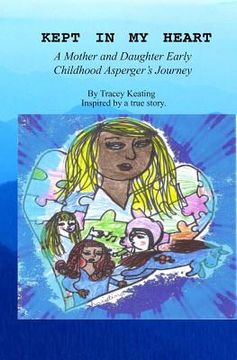Synopsis "kept in my heart (in English)"
Kept In My Heart, a collection of stories, is inspired by the author's experiences in raising a daughter with an Autism Spectrum Disorder known as Asperger's Syndrome and in working with over 30 students with ASD. The fictional characters, Ken and Tricia Kennedy, and their daughters, Holly and Shelly, went through the emotions and many of the same events as the author's family. Ken and Tricia brought a healthy newborn baby home, without suspecting any lifelong developmental disorder. They watched Holly develop and grow, excelling in some areas and struggling with others. Their hearts ached when they were unable to identify or meet her needs. Confusion reigned when given conflicting advice from so-called experts. They were hurt and angered when even those they loved blamed their child's difficulties on poor parenting. They learned what it means to support a child who has a hidden disability. Yet through it all, there was enduring love, humor, optimism and faith. Ride along for all the ups and downs, beginning before Tricia knew she was an "Autism Mom" and continuing through Holly's evaluations, diagnosis and early interventions. Because Tricia was trained as a Speech-Language Pathologist, some of her earliest concerns were about Holly's language and communication. Difficulty with self-help skills led to Holly qualifying for a special education preschool program due to "developmental delays" and "language delays." When an Autism Spectrum Disorder (ASD) was first considered, Tricia received conflicting professional advice. One said, "If you pursue the Autism label, you will be doing her a disservice. People will lower their expectations of her and she will never achieve her full potential." Holly's teacher argued, "If you have to take her to doctor after doctor to get her diagnosed with Autism, then that's what you need to do because that's what's right for your child. She is too bright to get help any other way. She will fall through the cracks without that diagnosis!" Parents, extended family, educators, medical professionals, church ministries and anyone interested in Autism Spectrum Disorders (ASD), will have the opportunity, through fictional stories, to see signs of Asperger's Syndrome in toddlers and early childhood. Relevant concepts about teaching children with Autism are revealed through story, including best practices as taught by a grant-supported Autism training through the STatewide Autism Resources and Training (START) project. Some of the concepts that Tricia learned from START include: you need to use the Autism to the student's advantage (rather than fighting the Autism); if you want a behavior, you need to teach that behavior; the response to behavioral errors should be non-emotional, non-verbal and non-punitive; you need to change the problem-solving task from emotional to cognitive and your goal should be to teach the student to get her needs met appropriately. Tricia learned that what could be interpreted as "noncompliance" might actually be a sign of a skill deficit. She learned that the primary purposes of education are to teach independence and socialization skills. "You can know everything in the curriculum from kindergarten through twelfth grade, but if you don't have independence and social skills, you are unemployable." Tricia also learned why it was so important that Holly have positive peer models. Holly was more likely to emulate another child (who was similar to her) than a teacher, parent or other adult. Tricia and Holly's teachers talked to Holly's class about her Autism. The students in the class gave examples of ways that Holly was like them and ways she was different. The class used a program called "Friend for the Day" to help include Holly in more group activities. The mission of this book is, through story, to educate, inspire, encourage and entertain individuals who are dealing with Autism or Asperger's, including families, professionals and all who care for them.

